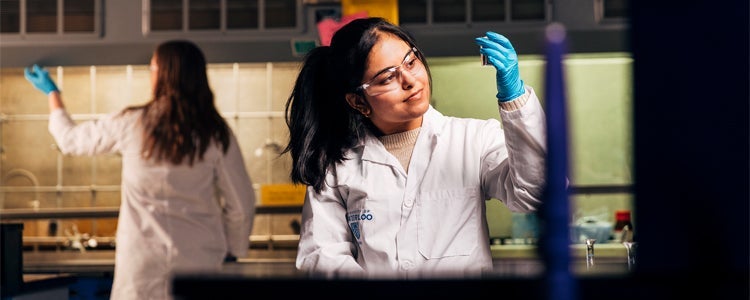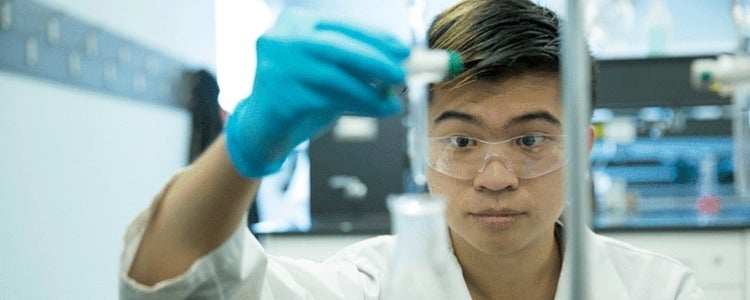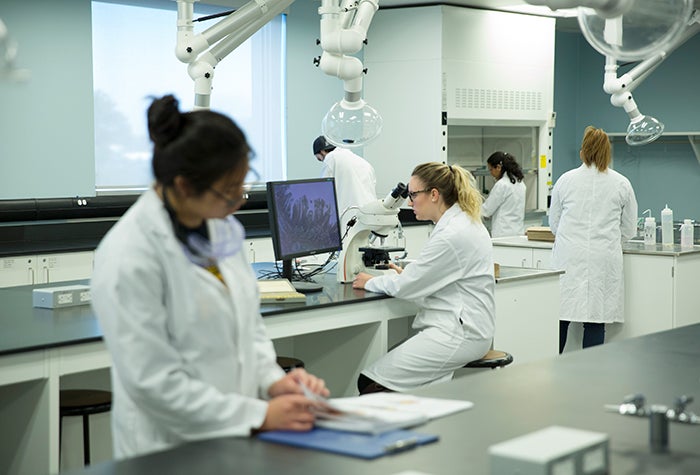Written by Jocelyn (she/her), student
Labs are one of my favourite parts of being a science major! But as a high school student, you might wonder what you can expect from a science lab in university.
Science labs can really help you understand and apply what you’ve learned in a lecture, and depending what you're learning about, they can really blow your mind. You’ll definitely get to do at least one super cool lab at some point during your degree.
For those of you who are already excited about university labs (I've been there!), here are the answers to some questions you've probably been wondering about.
What do I do before my first lab?
Before attending your first lab session, you’ll need to pick up your lab manual which outlines all the experiments you’ll be doing for the whole term. Depending on the lab course, you may be briefed your first week of the lab or you might jump right into an experiment. You’ll need a lab coat and goggles for your Chemistry and Biology labs and a hand lens for your Earth Science labs to check out your rock specimens. Talk about swag! (Unfortunately, physics labs don’t come with a cool outfit.)
When I bought my lab coat in first year it was really exciting for me cause it was like ‘wow! I’m a real science student now!’
Do I get a lab partner, just like in the movies?
Yes, for many lab courses you’ll need a lab partner so you can work in tandem together to get the experiment done on time. Lab partners aren’t assigned though, so if your BFF is in your lab section, go ahead and pair up with them.
In first year I paired up with my roommate and we had a fun time in the lab since we knew each other well already. If you don’t know anyone, that’s okay too, you might make a new friend!

What if I don't understand the experiment in the lab manual?
That’s what I thought just before my first physics lab (had no idea what an air track was) and I was so worried that I would fail my first physics lab ever (and potentially the whole term since the first day was off to a bad start). Luckily, in all of our labs, there are lab instructors and teaching assistants (TAs) to help out.
Before starting the lab, the lab instructor will go over some important tips and information for the lab and will usually show you how the equipment works, especially if it’s some sort of apparatus that you’ve never seen before.
You’ll need to read the lab procedure ahead of time and you’ll usually need to come with a completed pre-lab assignment or a summary of the experiment so that the TAs know you're prepared.
But if you still don't quite understand everything, don’t stress! It will be explained once you get to the lab and if you still don’t understand — ask for help.
What about the actual experiment?
Now, getting to the good part — the experiment! Science is pretty magical. Each lab is a new experiment and you’ll get to discover and experience something different.
If you're careful to follow the experimental procedure, you should be good to go. Remember TAs and the Lab Instructor are around for the entire lab so that you can ask questions whenever you need to. Also, remember to record data and observations that you’ll need for your lab report. If your results aren't what you expected, that's totally fine! Just record what happened along with your thoughts as to why, and you're doing it right!

I didn’t love every single lab I did, but there were definitely a lot of fun ones! Two of my favourite labs were the quantum dots lab and my first chemistry lab ever, where we observed the chemical properties of copper as it changed colours many times. Who knew that copper could change to a teal colour and a black colour? Awesome!
What's the deal with post-lab?
After your lab you’ll most likely have to submit a lab report — but don’t worry. In first year they’re pretty simple and there are questions to walk you through how to discuss your results.
Depending on what lab course you took, your lab report could be informal or formal, and it could be due at the end of the lab period or two weeks later. Double check your lab manual or ask your lab instructor so that you don’t get penalized for something super simple, like missing an introduction section, or handing your lab report in late.
Anything else I should know about?
Not every lab course has an exam, but most of them do. So make sure you know what’s going on in the labs and the theory behind each experiment because you will most likely be tested on it at the end of the term.
That’s all there is to it! Don’t stress, and embrace the hands-on learning that you get to do as a science student.
What you can discover about science outside the laboratory
Related articles

Labs – your next-level playground
Science labs can really help you understand and apply what you’ve learned in a lecture, and depending on what you're learning about, they can really blow your mind. For those of you who are already excited about university labs (I've been there!), here are the answers to some questions you've been wondering about.

Grab your goggles: Science Orientation is coming
Orientation — the kickoff to the next four or five years of your life. Get excited!

Is the scientist’s life the life for me?

